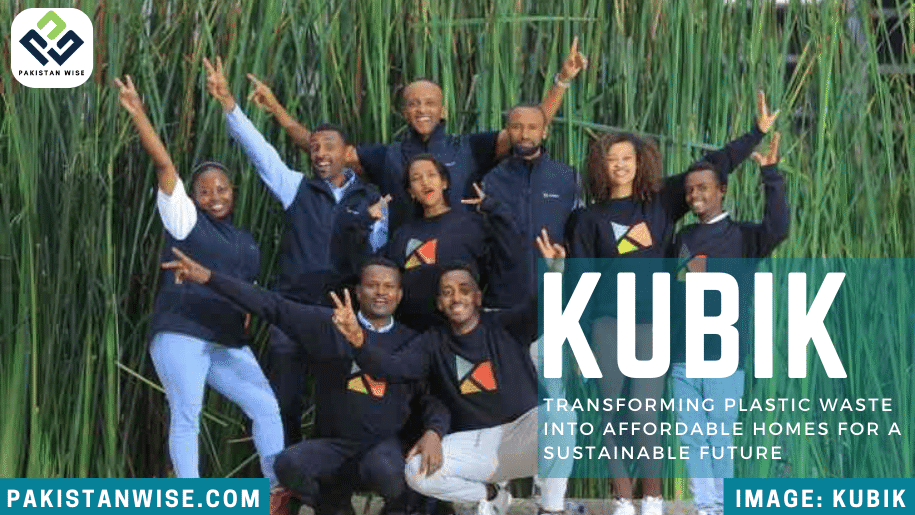Kubik: Plastic to Homes Innovation
Kubik Transforming Plastic waste has reached alarming proportions globally, and projections indicate a tripling of plastic waste to over 1,000 million tonnes by 2060. This crisis affects both developed countries, which currently produce the most plastic waste per person, and emerging regions like Africa and Asia, where rapid population growth and urbanization contribute to its exponential increase.
The environment and human well-being face significant threats due to plastic pollution. However, a beacon of hope emerges with the expected rise in the share of recycled plastic to 17% by 2060, thanks to enhanced plastic waste management efforts.
In Africa, Kubik, an upcycling startup, stands at the forefront of the continent’s recycling sector, effectively reusing plastic waste while promoting sustainability. Through its innovative approach, Kubik addresses environmental concerns and the urgent issue of affordable housing shortages simultaneously.
The Rise of Kubik
Kidus Asfaw and Penda Marre founded Kubik in 2021, positioning the startup as a pioneering force in Africa’s recycling and upcycling movement. Operating in Kenya and Ethiopia, Kubik addresses the current inadequacies of the continent’s recycling sector, which only salvages four percent of the plastic waste generated.
The startup specializes in converting hard-to-recycle plastic waste, including polyethylene, polypropylene, and polystyrene, into affordable building materials. By transforming these materials into bricks, columns, beams, and jambs, Kubik effectively diverts an impressive 45,000 kilograms of plastic waste from landfills each day.
Environmental Impact and Expansion Plans
Kubik’s operations have a multifaceted positive impact. Primarily, the startup significantly reduces the amount of plastic waste that would otherwise end up in landfills, thereby preventing environmental pollution and mitigating the harmful effects of plastic on ecosystems.
Secondly, by repurposing plastic waste into construction materials, Kubik offers an eco-friendly alternative to traditional building methods, decreasing the demand for resource-intensive materials like concrete and timber.
Kubik’s Commitment to Affordable Housing
In addition to its contributions to environmental conservation, Kubik aims to tackle the global affordable housing crisis. The startup’s plant in Ethiopia has the capacity to construct over a quarter million square meters of wall surface area annually.
This capability translates into the potential construction of up to 10,000 affordable homes per year, marking a significant stride towards addressing the existing deficit of over 300 million affordable housing units worldwide. By tapping into this $2 trillion market, Kubik not only presents a lucrative business opportunity but also brings hope to millions of individuals who lack adequate housing.
Recognition and Future Prospects
Kubik’s dedication to sustainability and innovation has garnered prestigious accolades. In 2023, the company received the Startup of the Year award at the Global Startup Awards, showcasing its pivotal role in driving positive change and leading climate-conscious entrepreneurship in Africa.
Furthermore, it was hailed as the top climate tech startup in Africa at the renowned VivaTech conference. These recognitions solidify Kubik’s position as a game-changer and inspire its future prospects.
Looking ahead, Kubik plans to expand its production operations in Ethiopia later this year, aiming to scale up its impact. The startup envisions extending its reach to other countries within Africa, replicating its success in tackling plastic waste and affordable housing challenges. With recent seed funding of $3.34 million, Kubik is poised to accelerate its growth and make an even more substantial impact on the continent.
Investor Support and Partnerships
Kubik’s recent funding round attracted a diverse range of investors who recognized the transformative potential of the startup. Climate Tech VC Satgana, Princeton Alumni Angels, and Andav Capital, among others, showed their belief in Kubik’s purpose-driven vision and unique business model. Romain Diaz, co-founder of Climate Tech VC Satgana, emphasized Kubik’s exceptional team and their position as a viable solution to Africa’s challenges. This investor support provides Kubik with the resources and network necessary to drive its mission forward.
Innovative Interlocking Building Materials
Kubik’s core focus lies in the development of interlocking building materials that revolutionize the construction industry. By eliminating the need for traditional components like cement, aggregates, and steel, Kubik’s materials, such as bricks, columns, beams, and jambs, enable developers to construct structurally sound walls.
Kidus Asfaw, CEO of Kubik, highlights that the strength of walls built with their products matches that of cement-based materials. This innovation not only enhances construction efficiency but also reduces costs and environmental impact.
Affordability and Sustainability
One of the key advantages of Kubik’s building materials is their affordability. Asfaw asserts that their products cost at least 40% less per square meter compared to traditional construction materials. This affordability plays a crucial role in addressing the housing deficit fueled by rising urban populations and high construction costs.
Additionally, Kubik’s materials possess chemical properties that ensure safety, non-degradability, and fire resistance. These low-carbon products significantly contribute to reducing greenhouse gas emissions, emitting at least five times less than cement-based alternatives.
Addressing Global Challenges
Rapid urbanization, unmanaged plastic waste, unaffordable housing, and climate change pose significant global challenges. Kubik recognizes its responsibility in addressing these issues. By providing a lower-carbon, cost-effective building solution that effectively removes plastic waste from the environment, Kubik aligns its mission with the urgent need for sustainable development. Asfaw underscores the company’s commitment to transforming the construction industry by driving technological advancements in materials and expediting the decarbonization of the built environment.
Related Article: Service Long March Tyres: $200 Million Investment for Pakistan Joint Venture
Conclusion
The escalating global crisis of plastic waste poses a severe threat to the environment and human well-being. However, amidst this alarming situation, Kubik, an upcycling startup, emerges as a beacon of hope in Africa’s recycling sector.
By effectively reusing hard-to-recycle plastic waste and converting it into affordable building materials, Kubik not only diverts a substantial amount of plastic waste from landfills but also addresses the pressing issue of affordable housing shortages. Through its innovative approach, Kubik significantly reduces environmental pollution, decreases the demand for resource-intensive materials, and contributes to the global effort of mitigating climate change.

